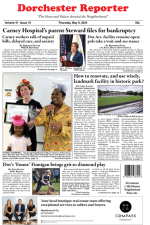July 20, 2023
Boston’s municipal election season is two months away but that doesn’t mean we should wait to mobilize voters. Year after year, our unpreparedness for elections as a state and city is starkly exposed – and the impacts are felt along racial lines.
Well before this fall and next year’s presidential election, state and city government officials and organizations must support programs that empower neighbors to educate and encourage other neighbors to vote. Without this localized approach, voter turnout will continue to languish and facilitate a less-than-representative democracy.
There is no doubt that our state’s democracy is struggling – inequities in voter turnout bear this out. Massachusetts ranks 48th in the country for the gap between white and BIPOC turnout, according to locally-based nonprofit Partners in Democracy, and BIPOC communities in Massachusetts are registered to vote at numbers lower than the national average. A 2021 MassVOTE report echoes these findings, showing that 7 of the 10 municipalities with the lowest voter turnout in the November 2020 elections, including Boston, had non-white populations that exceeded 50 percent of their total population.
This disparity contributes to the sad truth that we’ve known – and that the think tank MassINC has found about our political representation: our local and state legislators don’t reflect our diverse population.
This phenomenon conflicts with the very issue our Founding Fathers sought to eradicate, namely taxation (or legislation) without proper representation. In 2019, City Councillor Julia Mejia won her election by just one vote. In 2022, Kristin Kassner, now a state representative, from Hampton defeated a five-term incumbent by a single vote. With greater turnout, these elections could have gone differently and swayed policy and legislation on key issues like healthcare, housing, and cost of living that tend to more acutely impact BIPOC communities.
We must meet people where they are and acknowledge barriers to voting that inhibit turnout. A 2022 report from MassINC showed that 25 percent of polled Latinx voters who were eligible to register to vote but didn’t said they “don’t have time to,” “tried to and couldn’t,” or “need to learn more.” Without time in between jobs or other responsibilities, practical help with registering, and other resources, eligible voters may pass on voting.
Government officials and organizations can help meet this need by targeting the root causes of these voting barriers and facilitating neighbor-to-neighbor education programs. Massachusetts Voter Table (MVT) offers a robust example of what it takes to make voting more accessible. Along with their nonpartisan community-based partners and over 1,000 grassroots leaders they’ve trained, they have had conversations with close to 750,000 unique voters in gateway cities and Boston. Their successful campaigns, bolstered by this relationship building, have yielded victories in policy areas such as earned sick time, a $15 minimum wage, and affordable housing. We must facilitate campaigns like this one.
When people feel connected to their communities, they have a higher stake in election outcomes. At Union Capital Boston, we recognize and reward neighbors for community engagement and relationship building through an online points platform that awards Visa gift cards. Through volunteer opportunities, workshops, network nights, and more, our members also become deeply invested in their neighborhoods, communities, and the issues that impact them. In turn, our members turn out to vote at a higher rate (62 percent in the November 2022 election) than the general Boston public (40.38% in the 2022 election).
Commentators and analysts have proposed several explanations for the cracks in our election system. Some point to Massachusetts’s clear party imbalance, which produces uncompetitive elections and a sense that showing up to the polls is meaningless. Others say disparities in voter turnout persist due to voting accessibility issues, like long lines and a dearth of voting locations in less wealthy communities, that officials can address through measures such as same-day registration. Moreover, BIPOC constituents, who are less likely to live in wealthy neighborhoods, face growing voter suppression attempts that legislation and mobilization can combat.
While all these factors play a significant role in the democratic challenges we’re facing, a primarily people-centered obstacle ultimately demands a primarily people-centered solution. Creating a representative democracy doesn’t begin in the State House or with party politics. It begins in our neighborhoods and communities. Let’s not forget that the large movement to correct our imperfect democracy must start with small local steps.
Eric Leslie is founder and lead organizer of the nonprofit Union Capital Boston.


